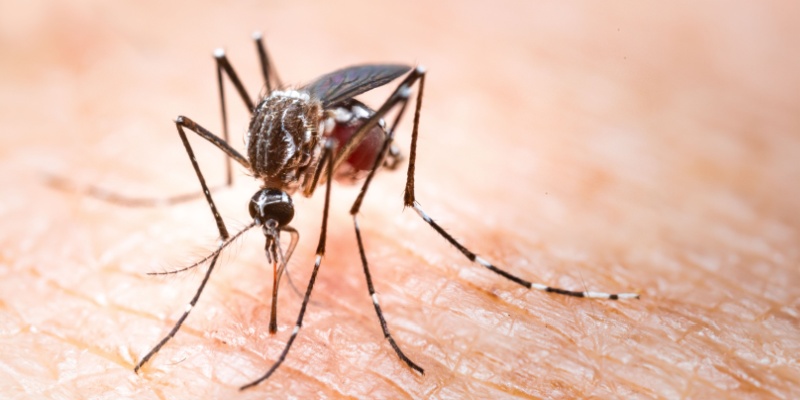While most Nashville residents view mosquitoes as merely annoying summer pests, health officials and pest management professionals like our team at All Pest Solutions understand they pose a more serious threat. Tennessee consistently ranks among the top states for mosquito-borne disease cases, making awareness and prevention crucial for Nashville families. Here's what you need to know about these health risks and how to protect yourself.
West Nile Virus: Tennessee's Primary Mosquito-Borne Threat
West Nile Virus (WNV) remains the most common mosquito-transmitted disease in Tennessee, with cases reported annually in Davidson County and surrounding areas.
Understanding West Nile Virus
- Primarily transmitted by Culex mosquitoes, which are common throughout Nashville
- Mosquitoes become infected by feeding on infected birds, then transmit the virus to humans
- Most active in late summer and early fall in Tennessee
- Primarily affects people over 50 and those with compromised immune systems
Symptoms and Risks
The majority of people infected with West Nile Virus show no symptoms. For those who do experience symptoms:
- Mild cases (West Nile Fever): Fever, headache, body aches, joint pain, vomiting, diarrhea, or rash
- Severe cases (Neuroinvasive Disease): High fever, headache, neck stiffness, stupor, disorientation, coma, tremors, convulsions, muscle weakness, vision loss, numbness, paralysis
La Crosse Encephalitis: A Threat to Tennessee Children
While less common than West Nile Virus, La Crosse Encephalitis (LACE) is particularly concerning because it primarily affects children under 16 years old.
Understanding La Crosse Encephalitis
- Transmitted primarily by the Eastern tree hole mosquito (Aedes triseriatus)
- Most cases in Tennessee occur in the eastern part of the state, but Nashville cases have been reported
- Typically occurs from May through September
- Children playing in wooded areas are at highest risk
Symptoms and Risks
Initial symptoms include fever, headache, nausea, vomiting, and lethargy. Severe cases can progress to:
- Encephalitis (brain inflammation)
- Seizures
- Coma
- Long-term neurological problems, particularly in children
While fatalities are rare (less than 1% of cases), children who recover may experience recurring seizures, learning disabilities, or other neurological problems.
Emerging Threats: Diseases to Watch in Tennessee
Eastern Equine Encephalitis (EEE)
Though historically rare in Tennessee, cases have been detected in surrounding states, and changing climate patterns may increase risk:
- Fatality rates for symptomatic cases exceed 30%
- Survivors often face permanent neurological damage
- Primarily transmitted in and around swampy areas
Zika Virus
While no locally-transmitted Zika cases have been confirmed in Tennessee, travel-related cases have been documented:
- Particular concern for pregnant women due to risk of birth defects
- Transmitted by Aedes mosquitoes that are common in Nashville
- Symptoms include fever, rash, joint pain, and conjunctivitis
Protecting Your Family from Mosquito-Borne Diseases
Personal Protection Measures
- Use EPA-registered insect repellents containing DEET, picaridin, IR3535, or oil of lemon eucalyptus
- Wear long-sleeved shirts and long pants when outdoors during peak mosquito activity
- Treat clothing with permethrin for additional protection
- Use air conditioning or window/door screens to keep mosquitoes outside
Property Management
- Eliminate standing water where mosquitoes breed
- Keep grass cut short and reduce vegetation where mosquitoes rest
- Clean gutters to prevent water accumulation
- Repair screens on windows and doors to keep mosquitoes out
Professional Mosquito Control
Professional mosquito management offers the most comprehensive protection:
- Targeted barrier treatments focus on areas where mosquitoes rest during the day
- Breeding site identification and treatment addresses mosquito populations at their source
- Seasonal protection plans provide ongoing coverage throughout Tennessee's mosquito season
- Integrated management approaches combine multiple strategies for maximum effectiveness
When to Seek Medical Attention
If you experience symptoms following a mosquito bite, especially during peak disease season, consult a healthcare provider promptly. Early diagnosis and supportive care are crucial, particularly for severe infections like West Nile neuroinvasive disease or La Crosse encephalitis.
At All Pest Solutions, we're committed to protecting Nashville families from mosquito-borne diseases through effective, environmentally responsible mosquito control services. Contact us today to learn how we can help safeguard your family's health through our comprehensive mosquito management programs.

